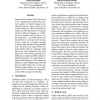801 search results - page 29 / 161 » The Inefficiency of Batch Training for Large Training Sets |
IAT
2009
IEEE
14 years 3 months ago
2009
IEEE
—We describe the design of an autonomous agent that can teach itself how to translate from a foreign language, by first assembling its own training set, then using it to improve...
EMNLP
2009
13 years 6 months ago
2009
Semantic Role Labeling (SRL) has proved to be a valuable tool for performing automatic analysis of natural language texts. Currently however, most systems rely on a large training...
NIPS
2007
13 years 10 months ago
2007
Empirical risk minimization offers well-known learning guarantees when training and test data come from the same domain. In the real world, though, we often wish to adapt a classi...
ACL
2010
13 years 6 months ago
2010
Conditional Random Fields (CRFs) are a widely-used approach for supervised sequence labelling, notably due to their ability to handle large description spaces and to integrate str...
ICASSP
2009
IEEE
14 years 3 months ago
2009
IEEE
We study key issues related to multilingual acoustic modeling for automatic speech recognition (ASR) through a series of large-scale ASR experiments. Our study explores shared str...

